1526 Our strongest suit
Best Canadian Stories 2021
by Diane Schoemperlen (editor)
Windsor, ON: Biblioasis, 2021
$18.99 / 9781771964364
Reviewed by Carol Matthews
*
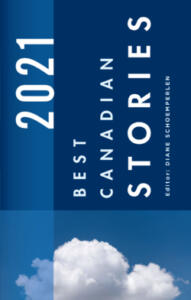 There’s a rumour that the short story is on the decline and that publishers, not to mention the public, prefer novels. And yet, here we have the 2021 edition of Best Canadian Short Stories. The anthology, published each year, is the 51st in the series, which surely is some testimony to the continued appeal of short stories for both writers and readers.
There’s a rumour that the short story is on the decline and that publishers, not to mention the public, prefer novels. And yet, here we have the 2021 edition of Best Canadian Short Stories. The anthology, published each year, is the 51st in the series, which surely is some testimony to the continued appeal of short stories for both writers and readers.
In doing an informal survey of friends and family, I found that at least half prefer novels. People who don’t read a lot say they enjoy the companionship of a novel they can dip in and out of, enjoying it over a period of time, re-entering it like a trip to a familiar place. Others, like me, appreciate the way a short story can very quickly take you out of the boredom or stresses of everyday life and transport you to another world which holds all the drama and excitement and emotion that an 800-page novel can offer.
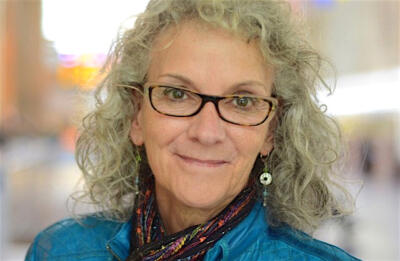
Best Canadian Stories 2021 includes 15 stories which have been chosen from close to a thousand stories that appeared in 24 print journals, 24 online journals, and 20 stories which were submitted directly to the editor. The writers are from diverse ethnic and cultural backgrounds and have won many prestigious awards. In addition to being writers, they reflect a variety of occupations – for example, fisherman, translator, artist, psychologist, educator and physician.
The collection features an assortment of styles, settings and situations, all seeming to reflect something of the unsettling times in which the stories were written and selected. Editor Diane Schoemperlen notes that, five months into the pandemic as she was sorting through journals, her brain was foggy but she realized that short stories could be the perfect antidote to the problem. She writes that she wanted stories that would “wreak havoc with conventions and expectations” and she wanted stories that were “both simple and complex, gorgeous and gruesome, sparse and loaded, humorous and heartbreaking.” And she found them!
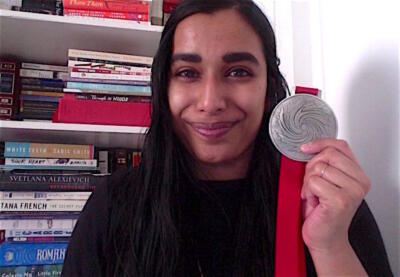
She was also looking for stories to which she felt a connection within the first few sentences and these stories all have that immediate hook. The opening story, “Let’s Play Dead” by Senaa Ahmad, begins this way:
There was a man, let’s call him Henry VIII. There was his wife, let’s call her Anne B. Let’s give them a castle and make it nice. Let’s give her many boy babies but make them dead.
We instantly anticipate the chopping off of Anne’s exquisite head, but we’re surprised by the body crawling towards it and fitting the parts back together. It turns out, you just can’t kill Anne. Henry tries everything: strangling, drowning, firearms, verbal abuse, but still she lives. Finally, he arranges for Anne to be taken to a lab, injected with poison, her bones crushed and organs removed, after which she is cremated, drowned, shipped to a remote island and vaporized by a nuclear bomb which destroys the whole island. After a week, here she is again “curled up in Henry’s favorite armchair like the slyest of cats, fast asleep, looking content.” Do we want to know how she did it? We find out on the last page!

The next story, Chris Bailey’s “What Would you Do?” begins with Clark moving a bed and finding a rifle case underneath it. “Don’t worry about it. Don’t even think about it,” Jane says. But, as with the principle of Chekhov’s gun, the rifle case is in Clark’s mind at the end of the story as he listens for the sound of a truck door closing.
Some stories are set in waiting rooms of walk-in clinics but only one refers specifically to the pandemic. In Lucia Gagliese’s “Through the Covid-Glass, “there are journal entries listing the number of deaths, the number of cases, and the daily plans that will help the narrator endure her period of quarantine. The plans include reading, exercise, housework, calling Mom, and watching Cary Grant‘s filmography starting with “Alice in Wonderland” and working through to “Once upon a Time.” Like the author, a clinical psychologist, the protagonist is a therapist, but by the end of the story she realizes that she’s no help to her patients and cancels most of her appointments. The number of cases has reached 130, 918 and there have been 9,184 deaths. “This cannot be how it ends,” is the ominous last line.
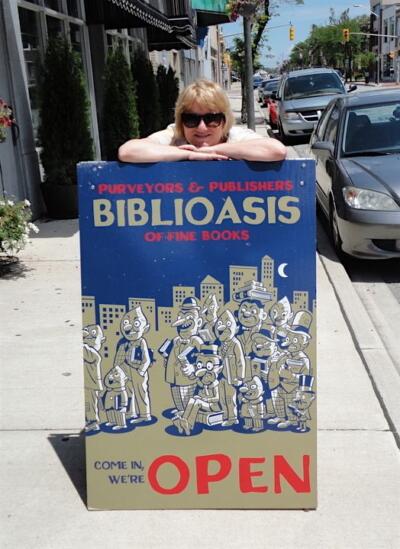
All the stories in this collection are worth reading. There are many tales of love and loss. Marriage has its own challenges. In Don Gillmor’s “Dead Birds,” Lia reports that her marriage wasn’t a disaster: “She was neither unhappy or happy with Bennett. Their lives were rote, and the explosion of having a child had settled into a new roteness.”
John Metcalf and Leon Rooke unanimously choose Colette Maitland’s story “Downsizing” for this year’s award, explaining that “Language was the winner as we hope it will always be,” and it is indeed a wonderful story, but not just because of its “dazzling, verbal performance.” It’s also very funny, recognizable and poignant in its telling of a curmudgeonly old man who argues with his wife but hopes she’ll continue to feed him because she’s still a fine cook and the evenings they spend sparring over Jeopardy and eating at their TV tables “are the best part of their time together.” But when Curt thinks of running into an old flame and wonders if maybe she has kept the portrait he’d drawn of her, we can feel the loss of dreams that were in the banker box of old sketches that his wife has thrown away. The marriage is far from perfect — Curt’s daughter has chosen to stay single because “You two didn’t make it look like much fun” — but there’s a whole life captured in these 14 pages, with all the anticipation and pleasure and disappointment and endurance such a marriage can hold.
“Clearly the short story is alive and thriving in the hands of Canadian writers,” concludes Diane Schoemperlen in her introduction to this year’s anthology. Steven Temple, who sponsors the Metcalfe-Rooke Award organized each year by Biblioasis and who has spent over forty years in the antiquarian book trade, concurs. “The short story has emerged as our strongest suit,” he says. “We live in the golden age of the short story.”
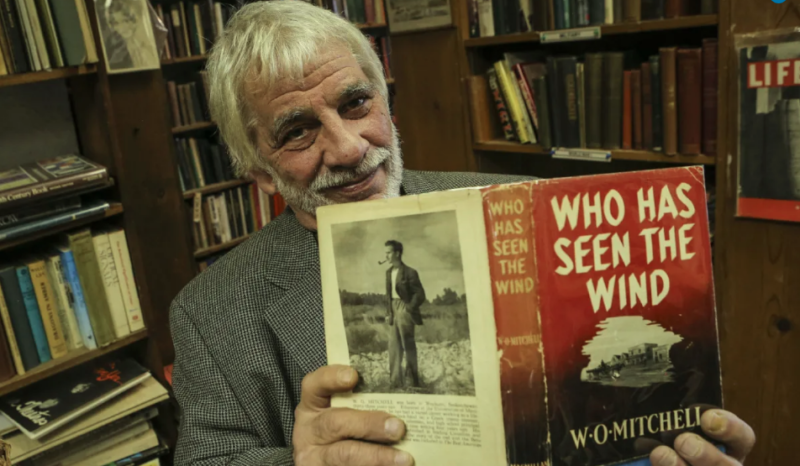
The short story is no less than a novel in any way other than in its length — and brevity has some advantages. In a short story every word is important. Without lasting long, a short story can take you to another world. It can contain all the elements of a novel in terms of character, plot, and setting, while being more focussed, quick and concise.
An anthology such as this lets you sample many different places and experiences that will stay with you, and it introduces you to writers whose work you will want to follow. As Schoemperlen says, “The best short stories … will always bring us news of the world and the shape of things to come.” Best Canadian Stories is full of stories that do just that. It’s a collection well worth reading.
*
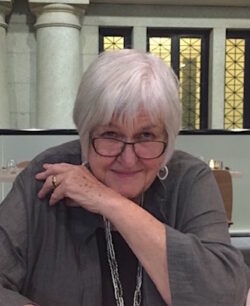
Carol Matthews has worked as a social worker, as Executive Director of Nanaimo Family Life, and as instructor and Dean of Human Services and Community Education at Malaspina University-College, now Vancouver Island University (VIU). She has published a collection of short stories (Incidental Music, from Oolichan Books) and four works of non-fiction. Her short stories and reviews have appeared in literary journals such as Room, The New Quarterly, Grain, Prism, Malahat Review, and Event. Editor’s note: Carol Matthews has recently reviewed books by Susan Juby, Charles Demers, Susan Sanford Blades, John Vigna, Hiromi Goto, and Anita Lahey for The British Columbia Review.
*
The British Columbia Review
Publisher and Editor: Richard Mackie
Formerly The Ormsby Review, The British Columbia Review is an on-line journal service for BC writers and readers. The Advisory Board consists of Jean Barman, Wade Davis, Robin Fisher, Cole Harris, Hugh Johnston, Kathy Mezei, Patricia Roy, Maria Tippett, and Graeme Wynn. Provincial Government Patron (since September 2018): Creative BC. Honorary Patron: Yosef Wosk. Scholarly Patron: SFU Graduate Liberal Studies.
“Only connect.” – E.M. Forster
4 comments on “1526 Our strongest suit”